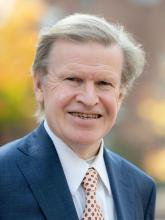You are here
Germany's Europeanised malaise
Oct 04,2021 - Last updated at Oct 04,2021
PRINCETON — The razor-thin outcome of the German election marks a watershed in the history of the Federal Republic, signaling the final disintegration of the near-two-party system that long characterised the politics of West Germany and then of reunified Germany after 1990.
Together, the old two dominant parties, the Social Democrats (SPD) and the Christian Democratic Union/Christian Social Union (CDU/CSU), have secured only around half of the vote. The result suggests that Germany has undergone a new degree of Europeanisation, acquiring some of the most destructive features of politics in neighboring countries. The upshot is that fragmentation and paranoia will now dominate German political life.
Western European politics in the post-war period rested on the alternation between centre-right (Christian Democratic) and centre-left (social democratic) parties. The parties representing these two broad positions were necessarily centrist, because they had to compete for what political scientists call the “median voter”. A party that pursued too much taxation and redistribution would offend the middle, as would a party that resisted solidarity and showed an insufficient commitment to the welfare state.
In Italy, this two-party dispensation disintegrated in the 1990s, when corruption scandals wiped out the Christian Democrats, and when the country’s small socialist party also faded. In France, the old arrangement stretched on until the 2017 presidential election, when neither of the mainstream parties’ candidates qualified for the run-off. Now, Germany, too, appears to be headed for a multi-party system featuring endless negotiations and inevitably complicated coalition agreements.
The most obvious loser in this year’s election is outgoing Chancellor Angela Merkel’s CDU, which has held office longer than any other party in the Federal Republic’s history. Up until the past decade, the CDU and its Bavarian sister party, the CSU, could generally count on securing over 40 per cent of the vote. Even when it received only 33 per cent in the 2017 election (compared to 20.5 per cent for the SPD), it still emerged as the strongest party and de facto coalition leader. But this time, the CDU/CSU has received only 24 per cent, and the SPD has surpassed it with 25.7 per cent.
The simplest explanation for this is that the Christian element of the Christian Democratic base has shrunk as Germany has become increasingly secular, and thus more disenchanted with both Protestant and Catholic organised religion. The German electorate also exhibits a widespread sense of fatigue and a longing for something new. Merkel’s departure represents the end of an era, and many Germans now feel that it is time for a change.
And yet, Germans are also gripped by nostalgia. They miss the time when their security felt relatively assured, and they worry about whether their country can meet the challenges of a rapidly changing world. After Chancellor Helmut Kohl’s stodgy provincialism in the 1980s and 1990s, Merkel came to power in 2005 promising a fresh outlook. But, in the end, she offered merely her own version of provincialism.
Notwithstanding the new fragmentation, the election’s outcome is still very German in the sense that a profound underlying consensus persists. With the exception of the far-right Alternative für Deutschland (AfD) and the far-left Die Linke, all of the parties were competing for the centre, all take environmental issues seriously, and all have strived to offer voters feasible solutions to the country’s problems.
In the end, German voters were not faced with an extremely polarised choice, such as between Jeremy Corbyn and Boris Johnson in the United Kingdom in 2019, or between Emmanuel Macron and Marine Le Pen in France in 2017. The AfD and Die Linke both performed worse than they did four years ago.
During the campaign, the Greens, the SPD, and the CDU/CSU all presented themselves as Merkel’s heirs. The CDU candidate for the chancellorship, Armin Laschet, emphasised continuity and party affiliation. The SPD candidate, Olaf Scholz, was finance minister in the last government and has sought to associate himself with the brilliant legacy of former Chancellor Helmut Schmidt, who was also from Hamburg, and who struggled continually with the SPD’s left wing. Finally, Annalena Baerbock of the Greens bears some resemblance to the young Merkel, who herself had been written off by rivals and the press as a lightweight.
The election was fought mainly on the grounds of character and personal appeal. The question was not who had the better programme but who was most trustworthy. The only exception was the Free Democratic Party, which advocates slightly more fiscal conservatism. With around 11 per cent of the vote, a small gain on its 2017 result, the FDP could play a significant role in the coalition negotiations.
A key feature of Merkelism was her strategy of consensus-building, or what her critics would call demobilisation. She always sought to create the impression that there were no truly important issues at stake in elections, and that there were few realistic alternatives to the mainstream position she represented. (Thus, she emphasized, correctly, that there was no alternative to the euro.)
But as we have seen in the UK and the United States in recent years, one of the most devastating consequences of the new populism is its subversion of trust in electoral outcomes. Some Germans will now take a page from this playbook to claim malign interference in the election. While the Greens looked to be significantly ahead in the polls at the start of the campaign, their support then slumped, perhaps owing to a wave of social-media campaigns designed to convince young people that the party supports absurd lifestyle prohibitions. Green supporters are now wondering whether these campaigns were the result of their party’s hard line vis-à-vis Russia and China.
Germany wanted to give up provincialism, but what it got instead is complexity. There still is no alternative, and now the political system seems less transparent and more manipulated than before. The next government will be decided behind closed doors. That is a worrying first chapter for the next era of politics in Europe’s most powerful country.
Harold James, professor of History and International Affairs at Princeton University, is the author of “The War of Words: A Glossary of Globalisation”. Copyright: Project Syndicate, 2021. www.project-syndicate.org












